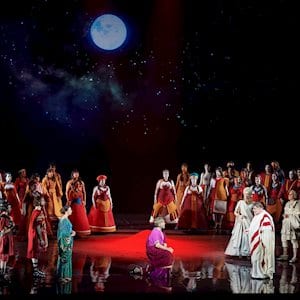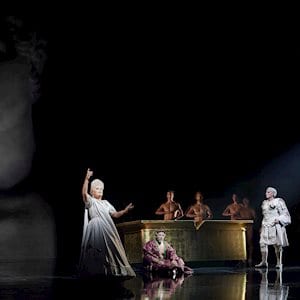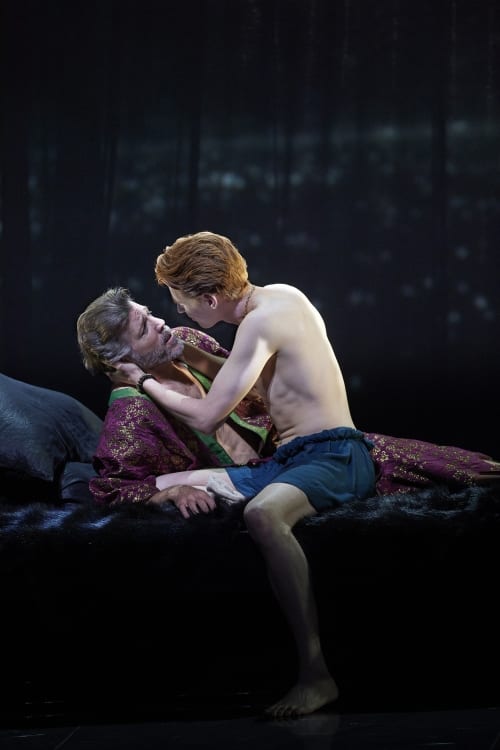The Canadian Opera Company’s new commission, Hadrian, proves without doubt that Contemporary Canadian Opera is alive and very well indeed.
Hadrian was composed by Canadian Singer-Songwriter Rufus Wainwright, with Libretto by Daniel MacIvor, and directed by Peter Hinton. Added to this high intensity team was the highly visionary and creative set, costume, and lighting design by Michael Gianfrancesco, Gillian Gallow, and Bonnie Beecher. This production demonstrates everything that can go right when we Canadians put our heads (and funding) together to produce a work that excels in artistry, music, theater, dance, and the gamut of aesthetic experience that opera ideally provides.
Many of us think of the Emperor Hadrian as a ruler whose empire was bordered at its northernmost point in Britannica by the famous wall built in his name. Hadrian was largely considered a benevolent dictator; his reign was peaceful, except for the Judean uprising that happened in his final years. But, as librettist Daniel MacIvor points out, he was also a ruler who, against the conventions of his time, chose to live in a homosexual relationship with a man he considered his equal — the Greek youth, Antinous. Hadrian and Antinous have six brief years together, spent traversing the territory of the Roman Empire, until Antinous mysteriously drowns in the river Nile, even as the lovers contemplate a return to Rome and a future of peace and stability. It is in this context that the opera’s action unfolds.

As the opera opens, we discover Hadrian bereft, unsure of his lover’s death as accident, or sacrifice, or treason. Hadrian can find no answers, and in his anguish, has retreated from his duties as ruler of the Roman Empire, even as unrest threatens to rise from Judea, where the Nazarines claim the presence of a one God, in direct opposition to the Roman pantheon. Hadrian is visited by the ghosts of his predecessors, the Emperor Trajan and his wife Plotina. Plotina, anxious that her status as a goddess will be compromised by the rise of monotheism, promises Hadrian two nights in which he may discover the truth of what happened to Antinous in exchange for his promise to stamp out the unrest in Judea. The rest of the opera is a dream journey through Hadrian’s passionate first encounter with Antinous, and the youth’s eventual death.

This opera is, at first glance, a great love story; but woven into this grand theme are deeply philosophical explorations on the nature of power, desire, and fear. Antinous is more than the Emperor’s object of desire, he is also a man described as “wise,” who calls on his fellow Romans to seek a greater understanding with their enemies. He calls on squabbling, fearful senators to see the Jews as human beings who are entitled to live and worship as they please. His character, set symbolically very much as a divine saviour in the cast of the Babylonian Tammuz, Egyptian Osiris, or the Christian Jesus, preaches a radical gospel of love made all the more incendiary because it intersects non-normative views on desire, with non-normative views on power and leadership. His death echoes the sacrificial deaths of all these gods, and provokes the question: why is it that we still need scapegoats, why do we still desire and need the permanent elimination of the other? An answer to these questions comes in the dying Hadrian’s final words that remind us that in time, even the empire of the one God will fall to ruin.
I went to this performance with a singular sense of apprehension. It’s no secret that Wainwright’s first opera Prima Donna was almost universally panned, and given the COC’s recent excursion into Contemporary Canadian opera with Louis Riel (2017), which was a disappointment, I did not have high hopes. But Wainwright’s new work, although flawed, was so full of profound lyricism, that it was impossible not to be captivated by its beauty. Wainwright has a clear command and respect for operatic tradition—one may hear echoes of Strauss, Wagner, or Britten, in his recitatives and grand orchestral modulations, but the poignant melodic arcs of his arias are all his own.
Peter Hinton’s direction brought out the nuances of this work, in which, poised between this world and the next, the story of an Emperor and his lost lover became a rippling pool on which to observe the rise and fall of greater existential questions on life, death, even God. Hinton claims to have drawn inspiration from Hadrian’s villa in Tivoli, setting the action within a series of subterranean passages which seem like a bridge between this here and the beyond. Set designer Michael Gianfrancesco captured this liminality with a minimalist set of black jet on whose mirror-like surfaces the dying emperor Hadrian, and the many ghosts who whisper in his ear, may gaze into the past.
It is extremely difficult to single out performances in this production because the ensemble and orchestra are so finely attuned to each other that each voice rises and falls with the kind of nuance that points to astute musical direction and painstaking familiarity with this new opera. We hear Johannes Debus, and the COC orchestra, at their very best. Although the first two acts did have moments of excess where the audience was barraged with sound, the third and fourth acts were exquisite and held the audience captive at the end of a rather long night (the opera runs at 3 hours).
Thomas Hampson, in the title role, is magnificent, his ability to shift through the many facets of his role as ruler, lover, son, husband, philosopher, or prophet, is a tour de force in character portrayal. Isaiah Bell’s Antinous was luminous, his bell-like tenor bringing an otherworldly beauty that heightened the sense of fatedness in his role. Hampson and Bell’s fearless love scene, quite likely a first in opera history, was handled with such tender candour that it left the audience absolutely smitten. Karita Mattila’s Plotina and Ambur Braid’s Sabina (Hadrian’s wife) had the opera’s most memorable arias, and they brought tremendous power, nuance, and sensibility to their renderings. Even as I write, I can hear Braid’s anguished lament as she realizes the full extent of Hadrian’s desire for Antinous, “He loves!” she weeps, her soprano soaring helplessly over the bass and tenor of the two lovers.
One hopes that the COC will continue this admirable trend of commissioning living Canadian artists to rejuvenate our operatic tradition. Tonight’s production proves without doubt, that stellar artistic collaborations produce works that can dazzle in our firmament. Hadrian is just such a work, and I expect it to live a long and happy life on national and international stages for many years to come.

